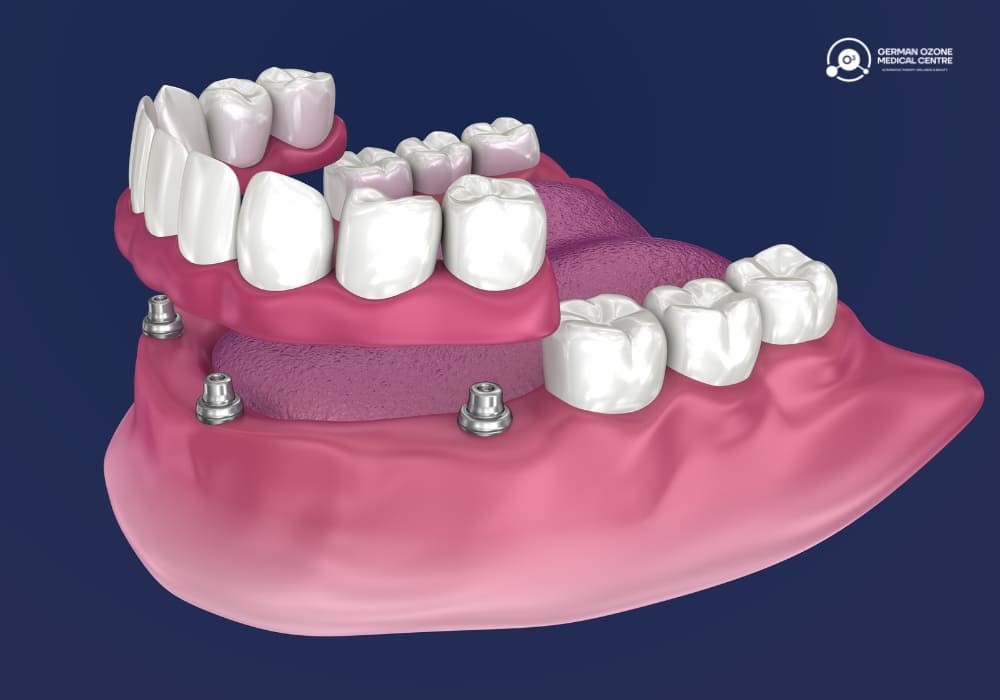If you’re missing multiple teeth and exploring tooth replacement options, you’ve likely come across two common solutions: implant-supported dentures and removable dentures. At German Ozone Medical Centre (GOMC), we understand that choosing the right type of denture is a significant decision that affects your comfort, oral health, and confidence. In this post, we break down the differences, benefits, and considerations to help you make an informed choice.
What Are Dentures?
Dentures are prosthetic devices designed to replace missing teeth. They restore function, improve speech, and enhance the appearance of your smile. Dentures are commonly recommended for individuals who have lost several or all of their teeth due to age, gum disease, or injury.
Types of Dentures
Traditional Removable Dentures
These are the most well-known form of dentures. Made of acrylic and resin, removable dentures sit on top of the gums and are held in place by suction or adhesives. They must be taken out daily for cleaning and are relatively affordable.
Implant-Supported Dentures
Implant-supported dentures are anchored to dental implants that are surgically placed into the jawbone. These dentures are more secure, offering a fit that closely mimics natural teeth. They can be fixed or removable, depending on the design and your preferences.
Key Benefits of Implant-Supported Dentures
Enhanced Stability and Comfort
Implant-supported dentures do not shift or slip while talking or eating. They feel more like natural teeth, giving you confidence and ease throughout the day.
Improved Jawbone Health
Implants stimulate the jawbone, helping to prevent bone loss that often occurs with removable dentures. This helps maintain facial structure and reduces long-term oral health complications.
Simplified Maintenance
These dentures can be cared for much like natural teeth—brushing, flossing, and routine dental check-ups. Fixed options don’t need to be removed daily, which is convenient for many users.
Potential Drawbacks of Implant-Supported Dentures
Cost and Insurance Coverage
Implant-supported dentures are generally more expensive than removable options. However, their longevity and health benefits often make them a worthwhile investment. Some insurance plans may partially cover the cost.
Surgical Requirements and Healing Time
Dental implant surgery requires time for the implants to fuse with the bone (osseointegration), which can take several months. Patients must be in good overall health for the procedure.
Eligibility Considerations
Not everyone is a candidate for dental implants. Patients need sufficient bone density and healthy gums. At GOMC, we provide bone grafting services for eligible patients to increase implant success.
Pros and Cons of Removable Dentures
Affordability and Non-Invasive Fit
Removable dentures are cost-effective and do not require surgery, making them ideal for patients who want a quick, budget-friendly solution.
Challenges with Slippage and Maintenance
Since they rely on adhesives or suction, removable dentures can slip or cause sore spots. They also require regular removal for cleaning, which can be inconvenient.
How to Choose Between Implant-Supported and Removable Dentures
Assessing Oral Health and Bone Density
A dental examination and imaging will help determine if your jawbone is strong enough to support implants. If not, bone grafting may be an option.
Lifestyle and Budget Factors
If you lead an active lifestyle and want a more permanent solution, implants may be ideal. If cost and non-invasive treatment are top priorities, removable dentures might be more suitable.
At GOMC, we’ll help you find the best restorative option for your needs and goals.
FAQs About Dentures
Q1: What is the main difference between implant-supported and removable dentures?
A: Implant-supported dentures are anchored to dental implants, while removable dentures rest on the gums and are not fixed in place.
Q2: Are implant-supported dentures worth the higher cost?
A: Yes. They offer better stability, jawbone support, and long-term durability.
Q3: How long do dental implants last compared to traditional dentures?
A: Implants can last 15+ years or more with proper care. Removable dentures typically need replacing every 5–8 years.
Q4: Can anyone get implant-supported dentures?
A: Not everyone. Eligibility depends on jawbone density, oral health, and general health. GOMC offers assessments and bone grafting when needed.
Q5: Do implant-supported dentures prevent jawbone loss?
A: Yes. Implants stimulate the jawbone and help prevent the resorption that occurs with traditional dentures.
Q6: How do I care for implant-supported vs. removable dentures?
A: Implant-supported dentures are brushed and flossed like natural teeth. Removable dentures must be cleaned and soaked daily.
Q7: What are the risks of dental implant surgery?
A: Risks include infection, nerve damage, and implant failure—but these are rare and minimized when performed by qualified professionals like our team at GOMC.
Q8: Are there alternatives if I can’t afford implant-supported dentures?
A: Yes. Traditional dentures or partials offer an affordable, non-surgical solution. GOMC also provides flexible financing options.
Final Thoughts
Both implant-supported dentures and removable dentures can restore your smile, but the right choice depends on your oral health, lifestyle, and goals. At German Ozone Medical Centre, we’ll help you explore all your options and provide compassionate, expert care every step of the way.
Book your consultation today to learn more about which denture solution is right for you.
Contact Information
- Phone Numbers: 055 024 2222 / 055 025 2222
- WhatsApp: 055 024 2222
- Address: Olusegun Obasanjo Wy, Dzorwulu, Accra. Opposite Allied Heights
